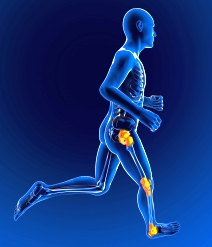| ||||||||||||||||||
|
|
'26.2' - The Marathon Training Website: Running Fundamentals Avoid Running InjuriesWith these tips for healthy running...
Getting Injured is the worst thing that can happen in the middle of your training. An injury will not only impact your training, but if you try to “run through” it to stay on schedule (as I have foolishly done in the past), you could end up with a much more serious chronic problem. In this article we often refer to marathon training but the principles are true whatever distance you are running.
Moderation is the key. Although susceptibility to injury varies tremendously from one individual to another. Factors like age, diet, ability, and previous running experience all play a part. So how do you avoid getting hurt? Here are some helpful hints. Too much is too much! Find the training balance that works for you. I have under-trained and over-trained for long distance events, with poor results either way. Train too little and you’ll have a hard injury-prone race. Train too much and you’ll leave your best finish time on the training roads because on race day your body will not be up to it. If you are following a training schedule, but feel you are struggling to keep up, it’s best to pull back, and modify your goal if necessary. Build your weekly mileage gradually Increasing your mileage too rapidly is one of the most common causes of overuse injuries. It seems so easy to add a few miles here and there to your runs to end up going from 20 miles one week to 30 miles the next. The rule of thumb is to keep the weekly increase to 10 - 15% or less of your previous week(s). I have gone from 20 to 25 miles in successive weeks without much problem, but as you get further into your training you should stick to the guideline. Alternate harder days with easy training ones. This is one of the ‘golden rules’ of training! This follows the principle of not doing too much at once. Your body needs more time to recover from long and/or faster runs. Your training schedule should be built around the hard day-easy day concept.
Check The Condition Of Your Shoes Bio-mechanical problems are another major cause of running related injuries. The condition of your shoes plays a big part in this. If you run in worn out shoes you put more stress on problems like over-pronation.
Heavier runners may want to change shoes more frequently. I normally have two pairs on the go, which is also useful when you have to run in wet weather. Running Surface This is another factor that can aggravate any skeletal issues with your legs and feet. Concrete is definitely the worst, so try and stay away from this kind of surface. Forest trails and woodchip paths are great for reducing the pounding on your legs, so whenever you get a chance to run off the road – take it!
Start slowly Make sure you start your training runs slowly, before you get to your intended pace. This is especially true during marathon training when you are doing a lot of miles each week, without a whole lot of rest days. It is especially important to warm up gradually in cold weather. Watch those minor aches and pains! Pay attention to new aches that can come up, especially as you increase your mileage. If you ignore these, they could become more serious, and prevent you from running altogether. It’s better to take a couple of days off and recover, than to try and keep on schedule. Put an ice pack on any sore spots after your run. This helps the recovery and healing process. Running shorter distances on flat, softer surfaces also helps. Feeling tired all the time? Long training runs or too frequent training can weaken your immune system, making you more susceptible to catching colds and contributing to a general fatigue. If you see this happening you know you are trying to do too much. The remedy is to simply cut back, and even skip your long run that week. Get enough sleep You body re-generates itself during sleep, so you need to make sure you are getting your full quotient while you are training. Do not cut back on your sleep to squeeze an extra hour into the day, as this will catch up to you as the time goes by. Cross Train Cross training like cycling and weight lifting help to counteract the imbalance in your muscular development that comes from doing only running. If you are cutting back on your mileage due to a minor injury, add a bike ride to your schedule. Eat healthy! Eating the right foods, and taking dietary supplements, can certainly help to keep you feeling better, and ward off minor ailments. You can read more about this on our Runner's Diet page.
| |||||||||||||||||






 This
one area in your body can lead to several running injuries including
hamstring and knee pain.
This
one area in your body can lead to several running injuries including
hamstring and knee pain. First
Time Marathon Runners
First
Time Marathon Runners